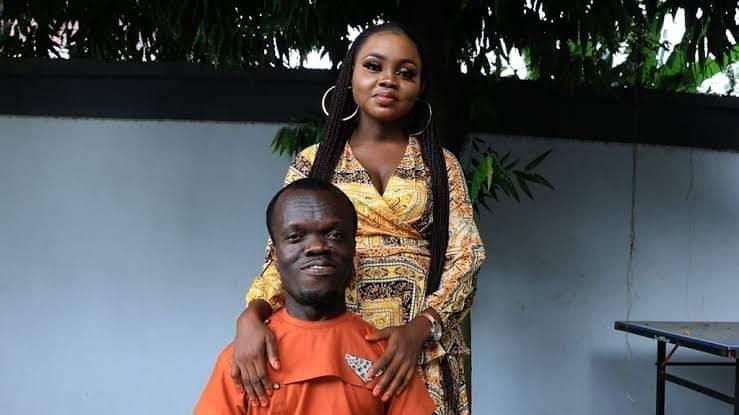
INTERVIEW: If I Were Of average Height, I Still Would Have Been Successful – Nkubi
In an exclusive interview with PREMIUM TIMES, Nkubi shares his journey as a child actor, his experiences as a broadcaster, actor, skit-maker, and most importantly, his life as a loving husband.

Meet Victor Nwaogu, popularly known as Nkubi – a talented Nollywood actor and On-Air personality (OAP) who has overcome numerous challenges to excel in broadcasting and skit-making.

He graduated from the University of Ibadan with a degree in Theatre Arts and tied the knot in 2021. He works at Wazobia FM as a TV presenter, voice-over artist, and content creator.
Nkubi has also appeared in several comedy skits alongside renowned comedians like Samuel Perry, aka Broda Shaggi. Furthermore, he has also starred in various Nollywood movies and series such as ‘Tinsel’, ‘Single Girls in Transit’, ‘Broken Dream’ (2005), ‘Golden Axe’ (2005), ‘Stupid Movie’ (2015), and ‘Holy Heist’ (2021), among many others.
In an exclusive interview with PREMIUM TIMES, Nkubi shares his journey as a child actor, his experiences as a broadcaster, actor, skit-maker, and most importantly, his life as a loving husband.
PT: How do you handle female admirers?
Nkubi: Female admirers? I’m a married man. I see them as regular friends. Fine, they love what I do, and I appreciate them. It is not far-fetched because the lines are always drawn, and that’s just it. There is nothing attached to it.
PT: Would you have been more successful if you were not this height?
Nkubi: I sincerely don’t know. I’m not God. First thing first, I’ll be grateful for what I’ve been able to achieve, at least for now. Looking at my nature, I know a lot of average-height individuals for the spot I am in right now. I can’t sincerely say because I am not a soothsayer and can’t define the future. What would the future have held for me if I were of average height?
Let me hold on to the existing reality. From what I’ve seen, I would still have been ambitious and chased my goals irrespective of how I must have emerged. Even if I were an average-height person, I still would have been successful.
PT: How did you find the confidence to talk to your wife?
Nkubi: The thing is, I grew up in a neighbourhood where talking was a norm. When I mean talking, it’s not the regular talking where you chat with your friends. I was born and raised in Oshodi, Mafoluku, and you know how crazy that place can be. Growing up, I grew up amid friends who would throw shades and words at you, and if you couldn’t respond to them, you didn’t belong in that caucus. Growing up as well, when you see ladies, there are certain words you tell them as well. So, it was not difficult at all. In the long run, it’s a yes or no answer, and then you move on with your life.
PT: Between skitmaking and broadcasting, which are you more passionate about?
Nkubi: I’ll say both, though, because, in the long run, it has to do with reaching out to the people. Broadcasting, you get to talk to millions of people anytime you go on a broadcast. For skit-making, it still reaches out to hundreds of people as well. There’s an endpoint to everything you do. For instance, as a broadcaster, as much as I love my job, I say, ‘Thank you for giving me this privilege to broadcast on your station at the end of the month. I’ll get paid for what I do. So, social media platforms exist today because there’s an endpoint to everything you do. I understand the position of having a passion for it, but in the long run, there’s always an end goal to what you’re performing for.
PT: Considering podcasts as a growing trend, any plan to go into it, and what would you focus on if you have to?
Nkubi: I started something relating to podcasts last year. Looking at what people tend to have now, it might need to be more structured. The podcast I had then focused on my nature and the people in this character class. I invite them over, and we discuss our nature, society, and other issues. Considering the setting of podcasts as well, my background was different. Sometimes, we sit on chairs depending on the topic. Occasionally, we could all lie down and discuss the issue in a room. You’ll find a couple of them on my YouTube channel.
It is something I’ve had in mind long before it became popular. You know this famous saying that sometimes you have a dream like some excellent thoughts in your head, don’t just believe that you are the only one stuck with such an idea. There are a million and one people simultaneously thinking the same way you think. Podcasts are almost everywhere now, and then let’s watch how it goes because there’s one thing with the Nigerian system. The moment one trending thing comes up, everybody jumps at it. The moment they jump into it, it becomes over-flogged, and it wanes out, but it is something I intend to do subsequently.
Kogi AD
Dangote adbanner 728x90_2 (1)
PT: How has your career been?
Nkubi: It’s been fine. At least, it concerns growth, improvement, and development. All these things are things that I am embracing and witnessing. At the least, the same Nkubi that started nine years ago as a broadcaster, the TV presenter is not the same today. I have had a lineup of improvements and experiences on the job. How I handled programmes in the past obviously would be different from how I handle programmes now. Because it is a development phase so we keep improving. Even in the theatre world, you learn from every job you put out there. It is a phase, so you gradually build up yourself as the day goes by.
PT: What are some of the challenges you faced?
Nkubi: Before my career, I will say I encountered challenges. Getting jobs was difficult after my university education. In a couple of jobs I applied for, they came up with stories when I scaled through the first and second phases when they discovered that you are a little person. All these things were what I had to go through.
The acting job, because I studied theatre at the university, was also something I had issues with because of the roles that were being offered at that early stage. It was a role that did not define our personality as little people. They were diminishing roles.
Roles that portray you as what society tends to see you as. For a couple of jobs that came by, the first question I usually ask is what role I’m playing, and if the person mentions functions like a spiritualist, herbalist or a Bushbaby, I opt out. They should think beyond this; you can’t keep imagining that this is how we live our lives or what we are.
Many of us come from ordinary homes where every family member is average height. Because we are little people amid multiple and millions of average-height people, it does not give you that fundamental that these people have because of the stories we’ve heard over time about what these people represent. Then you sum it up that this is what they indeed are. Our case is just a genetic case. Let’s see, and I hope gradually we’ll grow out of this. After the jobs came by, things were getting much easier because there is a face out there, and the look is a personality that represents a set of people; for that, they would consider what they offer you rather than what they used to offer
PT: Is there a personal thing you’re doing to change the wrong narrative about little people?
Nkubi: Yes, I started pushing that narrative long before my university education because I used to belong to a group of little people, and the group’s primary focus was to sensitise people about who we are rather than what they think we are.
As I keep up with my activities, for every little time I have, I try as much as possible to educate you about my nature, and then I’ve made a couple of attempts to push our stories out there. Every shot I might have made, either rejected or approved, is channelled towards a particular goal. While serving in Calabar, my major NYSC project would revolve around sensitising the state about little people and working with the state government to enlighten people further that this is what little people represent rather than what society thinks they mean.
Also, it was to further look into education because that is one key thing they truly need. Growing up, many little people were denied proper education for several reasons. I was pushing for that because you always need to discover who will emerge from such a project and be inspired to do something bigger. However, the project didn’t scale through because the state government said it had it on its hands.
Still, I kept up with my plans with the Calabar Carnival Commission. I forwarded a proposal to them to have the carnival coloured by bringing some elements of aesthetics into it. They should have many little people participate in the festival and see the results. The projected figure I forwarded to them was about 50 little people. You can imagine having about 50 little people under one band and the impact it would make. However, that was also not approved.
In the long run, I just kept up with what I do, and then, part of the podcast I talked about majorly revolved around my kind of people. The goal is to let Nigerians see a different narrative about little people that they can do something. They are well-educated and hardworking. I’ll keep pushing in my little way.
PT: How do you handle criticism?
Nkubi: To tell you the truth, I sincerely don’t care. I don’t care because, in the long run, whatever criticism I get from people might not add any value to my life. I was raised well as a child and know what is wrong or right. If my parents can be proud of me, that is as much as I turned out this way as a little person, and you are this successful. I was going by how they tortured me and my siblings; who are the individuals that would start criticising what I do?
I am not saying that I can listen to people or their advice, but there should be a limit to whatever you throw at me. Suppose I am getting some different benefits. If I see your criticism as something good, I can apply it to what I’m doing. However, on a general note, I don’t care because the moment you start paying attention to criticism, you further reduce your strength. Thank God for the kind of neighbourhood where I grew up, where nobody cares. You do your thing.
PT: What are your biggest fears?
Nkubi: Every individual has one. First of all, I want to keep growing. I want to keep up with the pace of what I have been able to achieve in life. I want to see myself stay within what I have achieved.
That is it for me. I can handle situations, but I want to see myself build on what I have achieved and keep growing on it. At least in the long run, my family, society and the country I represent would be proud of me. That’s just what I want to keep holding.
PT: Who are your mentors and idols?
Nkubi: I sincerely don’t have any. I might mention one name, but I get mentored by everybody around me. Looking at the entertainment world, you have several people who have added so much value to the entertainment world. I learn from every individual, and that is where I pick my motivation from.
So far, one name is the character of Tyron Leister in Game of Thrones. That was a defining character when I saw someone of my nature take up an essential role in the entertainment world, and then he delivered it top-notch. It was a moment of inspiration for me as a little person, and then it served as an inspiration for every other person.
PT: Tell us about your foray into entertainment
Nkubi: I started way young. I know I had a passion for entertainment, but while writing JAMB, I was shuttling between two courses: political science and theatre art at the University of Ibadan. The Nigerian factor, of course, in as much as I have a passion for entertainment, my primary goal was to break out of whatever shell at that point and become successful. I don’t care if it is entertainment or politics as long as I’ve been able to break out of whatever shell I was then. To achieve some goals, that is what I was aiming for.
PT: What would you do differently if you were to begin your career all over again?
Nkubi: What I would do differently is pay more attention to details. I would start on time rather than delay in some areas. Hold on to some critical advice early in my life, and work on them without procrastinating. Kick-off on time without allowing it to drag.
PT: Are there any current projects you’re working on?
Nkubi: For now, I would say no. I have a list of things I outlined last year, part of which is the podcast stuff I mentioned earlier, but at the moment, it is on hold. I’m trying to sort out some things before embarking on new projects. I have them outlined. The moment I’m done with what I have on my hands now regarding family and personal stuff, I will embark on this project.
PT: How would you describe your sex life?
Nkubi: I’ll leave it as this, it is well above average. It is perfect. I don’t want to go further.
PT: Considering your relationship experiences, particularly the one that was called off, how could you navigate your current in-laws?
Nkubi: I don’t want to dwell on that, but the good thing is I am in a perfect relationship with my in-laws. It must have started on a sketchy and slightly rough note early, but the relationship is ideal. I mean, you don’t expect any little person going to a particular family to ask for their daughter’s hands in marriage.
You don’t expect them to say you are welcome without some form of curiosity, especially when you come from the Eastern land, where we have a lot of traditional ideologies installed in the culture. So, that is just it. The most important thing is you confront them and deal with whatever inquisitive thoughts they tend to have about you. As long as I could deal with it, I was fine. I mean, we are two years down the line, and we are on good terms. We are moving on. Nothing more, nothing less.
READ ALSO: Steve Ayorinde celebrates 30 years of Nollywood in new book
PT: Do you have words for any little person out there?
Nkubi: Regarding issues like this, I’m a realist. I’ll state it the way it is. Of course, I’ll tell them to be ambitious, but they should know they have a challenge. They should identify what they must do to pull themselves out of that challenge.
The best advice I will give them is to know their strengths and know how they can build on them. Not on the surface but intensively. They should explore if they need to do that. Try out new ideas and be very protective while being consistent at whatever they are chasing because, by the time they keep up with this, in no time, everything falls in place. It might start to slow, but it doesn’t matter.










